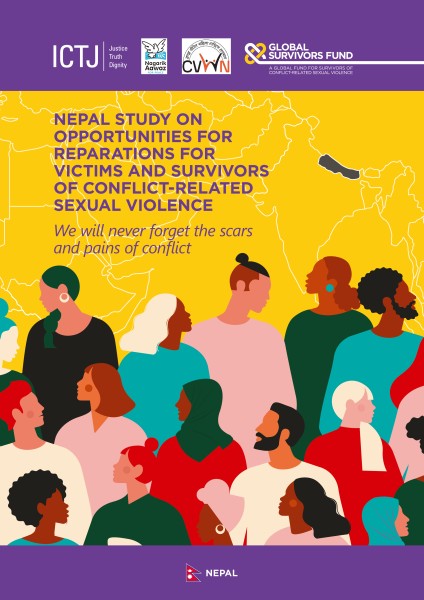We work side by side with victims to obtain acknowledgment and redress for massive human rights violations, hold those responsible to account, reform and build democratic institutions, and prevent the recurrence of violence or repression.
We Will Never Forget the Scars and Pains Of Conflict: Nepal Study on Opportunities for Reparations for Victims and Survivors of Conflict-Related Sexual Violence
This report presents the findings from research on the needs and expectations of women survivors of sexual and gender-based violence in Nepal. Based on in-depth interviews, it explores what happened to these survivors during the country’s decade-long war (1996-2006), what they need now in the form of reparations, and the many challenges they still face. It proposes steps for how Nepal’s government might implement reparations, in coordination with victims, civil society groups, and international stakeholders.

“I died every single day.” With those words, Avilasha (pseudonym), a victim of conflict-related sexual violence (CRSV), evokes the horror of the 23 months she spent in army custody during Nepal’s decade-long war, known by the Maoists as the People’s Revolutionary War. Avilasha’s story is but one of many similar stories told by women victims of CRSV who were interviewed in this country study, jointly produced by ICTJ, the Global Survivor’s Fund, Nagarik Aawaz, and the Conflict Victim Women National Network.
The study presents the findings from a study conducted on the reparative justice needs of CRSV victims in Nepal. Study participants come from each of Nepal’s seven provinces and represent diverse ethnic and economic backgrounds, ages, castes, and educational levels, and include members of marginalized populations residing in remote areas of Nepal. Victims of both sides of the conflict were interviewed.
These women’s stories are tales of sexual assault, brutality, mental and physical torture, and often ostracization by their own family and communities; some were thrown out of their homes with young children to an uncertain future. They are also the stories of entrenched impunity. None of the victims interviewed for this study reported receiving any form of justice for the crimes they suffered, even though some can identify and name the perpetrator and have reported the crime to the authorities.
Given the relatively small number of CRSV victims in Nepal, the delivery of adequate and effective reparation should be achievable. Yet, year after year, Nepal’s government and the political parties that make up its leadership have failed to take up the issue of reparations for CRSV victims and have done nothing to advance the policies necessary to meet their obligation to provide redress to victims of the conflict.
The study describes what should be done and offers approaches for how reparations can be made a reality, in keeping with international standards and the CRSV victims’ need for confidentiality.